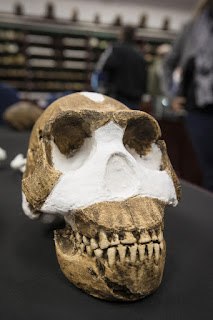Figuring out Homo naledi
Homo naledi has been a delightful development in my life, and I had nothing to do with the actual research. I just got up one morning and found two emails from some very early risers who had already read the press coverage. That derailed my whole day's work as I concentrated on better understanding what exactly Homo naledi was and what it might mean for my understanding of creation. Few things get me more wound up than new hominin fossils.
As you might expect, though, there have been some folks happy to use Homo naledi as yet another opportunity to mock creationists. It's tiresome, but it comes with the territory. Apparently, because creationists disagree about the significance of Homo naledi (and specifically about whether or not it's human), we're stupid, anti-scientists, clueless, whatever. Of course, I could reverse that opinion, since there's not a lot of agreement on just what Homo naledi means for human evolution. What's good for the goose is good for the gander, but that really would be stupid to claim that people are stupid just because they don't agree about something.
Normally, I don't like to pay much attention to insults, but the story going around is that I don't know what Homo naledi is. Specifically, my hesitance to speak publicly and declare Homo naledi an ape (or a human) has been interpreted as uncertainty. I want to publicly clarify that I'm not uncertain at all. Actually, since the first day I heard about Homo naledi, I've been quite confident about what H. naledi is, and I'm mighty tempted to put my opinion right here and take my stand with the other creationists who have declared their opinions.
But the reality is that there are larger issues here. Many of my readers know that the "historical Adam" has become a debate in evangelical Christianity. There are some scholars calling us to abandon traditional belief in a real Adam and Eve and instead adjust our theology to do without such characters. As you might imagine, I don't agree with such things, but I think that the question of the historical Adam is just a superficial issue on top of much bigger problems. Questions about worldview, science and faith, and evolution in general form an important context within which we pursue answers to questions about the historical Adam and Homo naledi. To strip questions like "Was Adam a real person?" or "Is Homo naledi just an ape?" out of the larger context is to do a great injustice to scholarship as a whole. The average churchgoer just wants easy answers, but the reality is that easy answers aren't very easy to come by. Answering questions about Adam and Homo naledi takes a lot of effort, and what you think about those answers will depend greatly on other questions that might seem unrelated until you start digging into the issues.
So I've got bigger fish to fry here. I'm not interested in giving some knee-jerk response to naledi. I'd much rather consider and re-consider my own conviction about naledi. I want to consult others who know more about subjects that I don't (like geology and theology). I want to consider other sorts of data than the type I usually focus on. Unfortunately, that means I don't get to share what I think right away, but that's an important lesson. We as a church need to become more comfortable with the discomfort of not knowing things right away. Answers are not easy, and we need to understand that.
If Homo naledi can help teach us patience and longsuffering, then God bless Homo naledi.
(Photo is courtesy University of Witwatersrand)
Feedback? Email me at toddcharleswood [at] gmail [dot] com. If you enjoyed this article, please consider a contribution to Core Academy of Science. Thank you.
